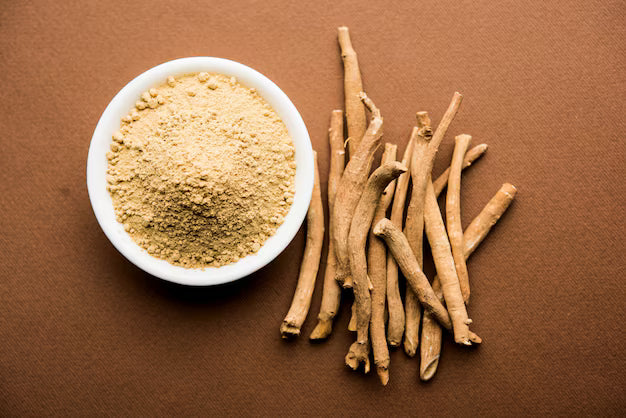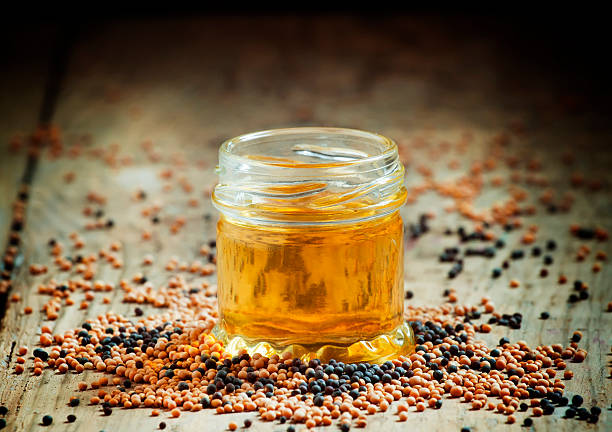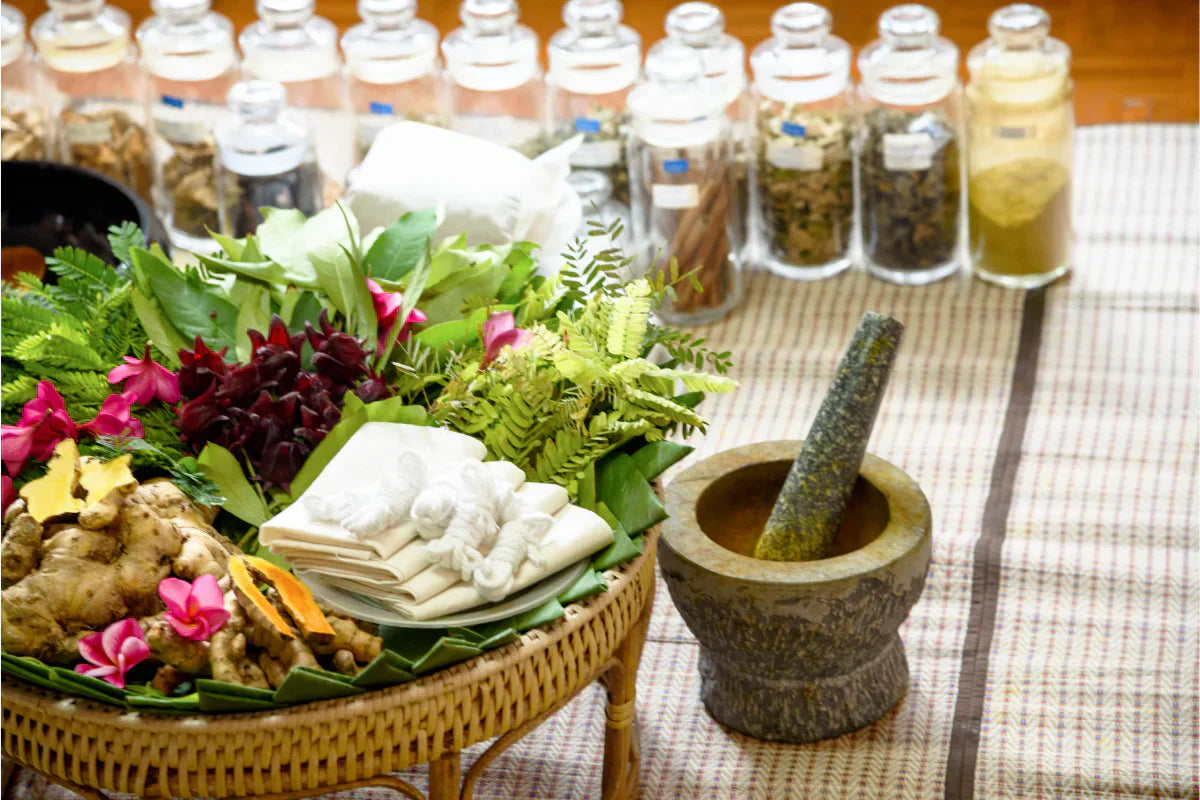Ashwagandha Powder: Health Benefits, Uses & Intake Methods

Understanding Ashwagandha: Origins and Significance
“Golden Mylk” latte, the top-selling wellness drink in Chicago’s famous Oromo Café chain, has a familiar ingredient that never fails to delight visiting Indians. The ‘secret’ elixir in the drink is none other than the potent Ayurvedic herb, Ashwagandha. One of the first Ayurvedic herbs to be recognised by the Western world as a natural adaptogen, Ashwagandha was in popular use in Vedic India way back in the second century BC. Today, from Jennifer Aniston to our very own Deepika Padukone, all are strong advocates of this vitalising herb – sometimes referred to as the Indian ginseng - and used in wellness potions, lattes, curative herbal formulations and even skincare rituals.
Ashwagandha (Withania somnifera) in Sanskrit means ‘smell of a horse’. Indeed, the herb has a distinct aroma, but the name also alludes to its strength-giving properties that help build resilience and vigour. The origins of the herb may be traced to the drier regions of India, north Africa and West Asia, where, for centuries, it has been used in curative powders and tinctures.
Validated by scientific research and reports in leading health organisations such as the National Institutes of Health (NIH, US), the efficacy of Ashwagandha is well established worldwide. In one of the reports, the NIH states: ‘In several studies, people who took ashwagandha for 6 to 8 weeks reported that they felt less stress and anxiety as well as less fatigue and sleeplessness. Ashwagandha also lowered stress hormone levels.’ In Ayurveda, Ashwagandha is often used to promote holistic health by balancing the three doshas (energies within the body, believed to govern physiological activity) —Vata, Pitta, and Kapha.
Nutrients in Ashwagandha Powder
Its root has volatile oils, alkaloids like withaniol, Hentriconate, and somniferin
Key Benefits of Ashwagandha Powder
1. Cognitive Support
This remarkable herb is known for its potential to improve mental clarity and focus. By calming the mind, Ashwagandha may help reduce anxiety and promote a balanced mood, making it beneficial for those facing daily stressors.
2. Benefits for Men
Ashwagandha is often regarded as a natural booster for male vitality. It may enhance strength and stamina, supporting sexual health and overall physical performance, which can be particularly beneficial for those experiencing sexual debility.
3. Benefits for Women
For women, Ashwagandha may help regulate hormonal fluctuations, offering relief from PMS symptoms and supporting reproductive health. It is also traditionally used to combat conditions like leucorrhea when combined with ghee.
4. Enhances Immune Function
Regular consumption of Ashwagandha may support the immune system, helping to protect against common ailments and promoting overall health.
Also Check Top 6 Powerful Immunity Boosters-->
5. Anti-Inflammatory Properties
Ashwagandha’s anti-inflammatory effects can be beneficial for those suffering from joint pain or inflammatory conditions, providing relief and promoting mobility.
6. Weight Management
Whether you are looking to gain weight or manage it, Ashwagandha is recognized for its ability to nourish the body, making it a versatile addition to any wellness routine.
7.Effective for children
It nourishes the children because of its Brihaniya ( nourishing) and Rasayana Properties. It helps children to gain their weight specially in emaciated conditions. When given with milk and ghee.
How to Incorporate Ashwagandha Into Your Daily Routine
1. With Warm Milk
For a calming effect, mix Ashwagandha powder with warm milk before bedtime. This traditional remedy may support better sleep and stress relief, making it an ideal evening ritual.
2. With Ghee for Weight Gain
If you’re looking to gain weight, combine Ashwagandha with ghee and warm milk. This combination is believed to nourish the body and build strength, especially in those recovering from illness or fatigue.
3. For Joint Pain
If you’re experiencing discomfort from inflammation, mix Ashwagandha powder with warm water or milk. This may help alleviate joint pain and promote mobility.
4. Recommended Dosage
The typical dosage ranges from 3 to 6 grams twice a day, depending on individual needs. For insomnia, it’s often recommended to take it once at night. Always consult with a healthcare professional for personalized advice.
5. Best Time to Consume
Morning consumption on an empty stomach is ideal for those looking to enhance vitality (Rasayana purpose), while evening doses can be more beneficial for stress relief.
6. Safety Considerations
While Ashwagandha is generally safe, those with specific health conditions or sensitivities should seek guidance from a healthcare provider before starting.
Precautions and Side Effects of Ashwagandha
-
Common Side Effects
While Ashwagandha is generally safe, high doses may lead to digestive upset or drowsiness in some individuals. It’s important to start with a lower dose and monitor your body’s response.
-
Who Should Avoid It
Pregnant women should consult their doctor before using Ashwagandha, even though it is often considered safe. Additionally, those with hyperthyroid conditions or taking certain medications, such as antidepressants, should seek medical advice before incorporating it into their routine.
-
Interactions with Medications
Ashwagandha may interact with various medications, including those for thyroid issues and mood disorders. Always inform your healthcare provider about any supplements you are taking.
-
General Precautions
Individuals with a history of allergies to nightshade plants (which include Ashwagandha) should exercise caution. It’s also advisable for those with digestive issues to consult a professional before starting.
-
Consultation Recommended
For personalized guidance and to ensure safe use, consulting with an Ayurvedic expert or healthcare provider is highly encouraged. They can provide tailored advice based on your health history and needs.
Comparative Benefits: Ashwagandha vs Other Herbs
|
Herb |
Key Benefits |
Unique Qualities |
|
Ashwagandha |
Supports stress relief, boosts energy, enhances cognitive function |
Adaptogen known for balancing Vata, Pitta, and Kapha doshas |
|
Shatavari |
Supports female reproductive health, balances hormones |
Often used for nourishing women during pregnancy and lactation |
|
Enhances memory, reduces anxiety |
Known for promoting mental clarity and cognitive function |
|
|
Supports respiratory health, boosts immunity |
Revered as a sacred plant in Ayurveda with adaptogenic properties |
In comparing Ashwagandha with other herbs like Shatavari, Brahmi, and Tulsi, each offers unique benefits that cater to different health needs. While Ashwagandha is primarily recognized for its stress-relieving and energy-boosting properties, Shatavari is celebrated for its supportive role in women's health. Brahmi shines in cognitive enhancement, while Tulsi is revered for its immune-boosting qualities. Understanding these differences can empower you to choose the right herb for your specific wellness goals.
Ayurvedic Context of Ashwagandha
Traditionally, Ashwagandha is revered as a rasayana (rejuvenative tonic) in ayurveda used to support physical vitality and longevity. However, its wide-ranging benefits include promoting a clear, calm mental state conducive to meditation.
In Ayurvedic texts down the centuries, Ashwagandha is mentioned as a remedy for myriad ailments, ranging from stress and anxiety to reproductive health. The herb is said to balance the doshas Vata and Kapha and promote holistic health. Culturally, Ashwagandha is widely used in rituals and traditional ceremonies, symbolising strength and resilience.
Conclusion: Should You Add Ashwagandha to Your Routine?
Yes, ideally in consultation with an Ayurveda practitioner to ensure optimum, personalised benefits and safety. Ashwagandha powder is believed to enhance your overall well-being and bring balance while boosting vitality.
Especially in the context of high-pressure modern living and environmental stressors, incorporating Ashwagandha into your daily wellness routine could be a significant positive step in your journey to be the best version of yourself: mind and body.
As you consider integrating Ashwagandha into your wellness journey, remember to do so with mindfulness and respect for its rich heritage.
Ready to experience the power of Ashwagandha? Shop Maharishi Ayurveda Ashwagandha Churna today and bring balance to your daily life.
FAQs
1. Is Ashwagandha churna safe to take daily?
Yes, Ashwagandha is generally safe for daily use for up to 2-3 months. However, it's best to consult with a healthcare provider for personalized advice.
2. What are the side effects of Ashwagandha?
Common side effects may include digestive upset or drowsiness, particularly at high doses. It's advisable to start with a lower dose to assess your tolerance.
3. Can I take Ashwagandha during pregnancy?
While Ashwagandha is often considered safe, pregnant women should consult their doctor before using it to ensure safety for both mother and child.
4. How long does it take to feel the effects of Ashwagandha?
Effects may vary, but many people report feeling benefits within a few weeks of consistent use, especially for stress relief and energy enhancement.
5. Can Ashwagandha help with weight management?
Yes, Ashwagandha may support weight gain in underweight individuals and can also help in managing stress-related weight fluctuations.
6. Is it safe to mix Ashwagandha with other herbs?
Yes, Ashwagandha can be combined with other herbs like Shatavari for synergistic effects, but it's best to consult with an expert for personalized combinations.
7. What is the best time to take Ashwagandha?
For stress relief, it is often recommended to take Ashwagandha in the evening with warm milk, while morning doses may support vitality and energy.
Popular Posts

Rheumatoid Arthritis in Ayurveda: Can Detox and Digestion Support Joint Health?
23 Jan, 2026Rheumatoid arthritis (RA) is a widely known joint condition, but did you know that Ayurveda trace...
Read more
Natural Ayurvedic Detox: Gentle Home Remedies
23 Jan, 2026What does natural detox really mean in Ayurveda? Essentially, this practice refers to the elimina...
Read more
Winter Weight Gain and Brain Fog: Ayurveda Explains Why
22 Jan, 2026What’s the trigger for winter weight gain? Why do we often experience brain fog, feel dull and he...
Read more





 Popular Read
Popular Read


















































